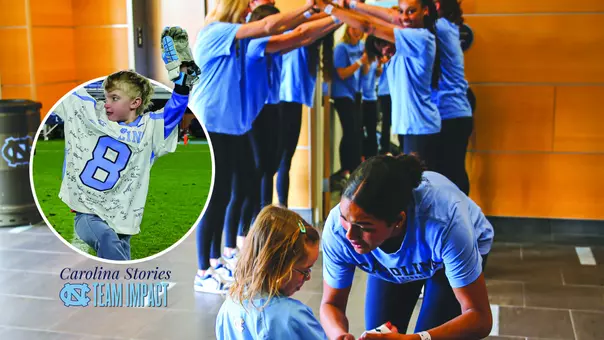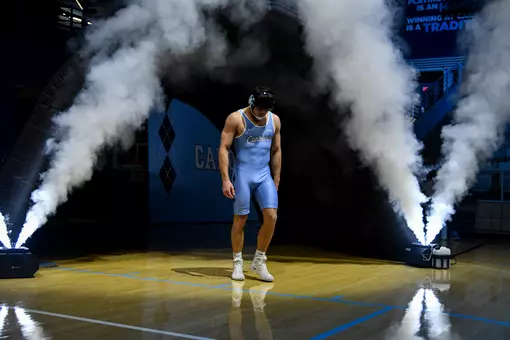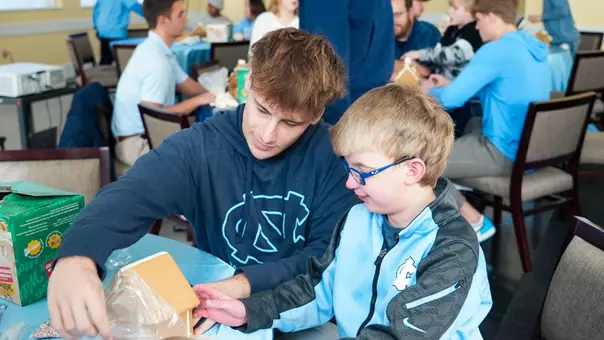University of North Carolina Athletics

GoHeels Exclusive: Making Mental Health A Priority
October 25, 2018 | General, Featured Writers, Student-Athlete Development
By Pat James, GoHeels.com
As a tennis player at Notre Dame in the 1970s, Dr. Brian Hainline, the NCAA's chief medical officer, went through a bout of depression so severe that he considered dropping out of school.
He ultimately just quit the tennis team, costing him his scholarship. But after a year-long hiatus, he returned to the sport for his senior year, during which he played No. 1 singles and doubles for the Fighting Irish and paid his own way.
"Tennis became mine. It wasn't my parents' or my coach's," Hainline said. "But I understood the depths of what it could mean to be deeply clinically depressed. And I said, 'I am going to do everything in my power to address this issue for the rest of my life.'"
That motivation subsequently brought Hainline to Chapel Hill last Thursday, when he spoke with UNC faculty and Athletics staff for a Student-Athlete Mental Health and Well-Being Workshop.
The purpose of the four-hour workshop, organized by the Committee on Collegiate Sports at UNC in conjunction with the Faculty Athletics Committee (FAC), was to provide attendees a better understanding of the mental health challenges that student-athletes face. The mental health resources available to all Carolina students were also detailed.
According to the Centers for Disease Control and Prevention, nearly 50 percent of U.S. adults will develop at least one mental illness during their lifetime. For a student-athlete, that might occur when their sport is taken away from them, perhaps due to an injury or their performance.
As Dr. Jeffrey Spang, an associate professor with the Department of Orthopaedics at the UNC School of Medicine and a FAC member, noted before introducing Hainline, such instances can leave student-athletes searching for their identity.
"You couple that with the standard athletic desire to have people who are tough, to have people who will push through," Spang said, "that's one of the reasons these people are successful is because of their ability to push through when others can't.
"Then you put in the general stigma our society has about mental health issues and treating mental health issues, and you can see why in this unique group of students, the demands are extra high, the burdens are extra high and the problems can be extra difficult."
Recently, student-athletes have become more vocal about those problems.
When Hainline became the NCAA's first chief medical officer in 2013, he said a major emphasis was placed on studying concussions. But members of student-athlete advisory committees across the country asked him and the NCAA Sports Science Institute to also address mental health.
"They all independently said to me, 'Dr. Hainline, look, we get concussions. Can you please make mental health your priority?'" Hainline recalled. "Those were the student-athletes. And they have led the way ever since then."
Toward the end of 2013, Hainline organized the NCAA Mental Health Task Force, a group of nearly two dozen scientists, clinicians, policy experts, team physicians, administrators, coaches and student-athletes. The Sports Science Institute subsequently published "Mind, Body and Sport: Understanding and Supporting Student-Athlete Mental Wellness," a guide to student-athlete mental health. A best practices guide for how athletic departments can support student-athlete mental wellness was then drafted.
Hainline spent part of his keynote presentation discussing both documents. He especially stressed the key components for understanding and supporting student-athlete mental wellness on college campuses, as laid out in the best practices guide.
Those components are: Clinical licensure of practitioners providing mental health care, procedures for identification and referral of student-athletes to qualified practitioners, pre-participation mental health screening and health-promoting environments that support mental well-being and resilience.
Everyone, from the athletic director down, helps create such environments.
"Our goal is for mental health disorders to be as equally accessible and managed as an ankle sprain," Hainline said. "Every coach knows the culture is that mental health and physical health are equally managed. And what we're empowering the coaches with is to let them know when you have a mental health disorder, you're actually much more likely to perform poorly and you're actually much more likely to become injured …
"We are now in the process of understanding how do we completely empower our coaches because the coach is the single-most important influence on our student-athletes."
During his presentation, Hainline said on his last visit to UNC, he met not only with Director of Athletics Bubba Cunningham, but also Cunningham's entire staff. They discussed how Carolina can specifically address its student-athletes' needs.
In 2014, UNC hired Dr. Jeni Shannon, the Director of the Carolina Athletics Mental Health and Performance Psychology Program, to provide performance enhancement and psychological services to student-athletes. Demand steadily grew, and she moved from a part-time position to full-time in January 2017.
Dwight Hollier was then hired as an associate athletic director for student-athlete health, well-being and program outreach in September. In that role, he oversees the strength and conditioning, sports medicine and nutrition, and student-athlete development units within Athletics.
Mental Health First Aid is also offered by the School of Social Work. The eight-hour training –which workshop attendees received an introduction to from Jodi Flick, a licensed clinical social worker and clinical associate professor in the School of Social Work – teaches you how to help someone who is developing a mental health problem or experiencing a mental health crisis. Some student-athletes have completed the full training so they can better support teammates.
Stigmas about mental health still exist, though.
To explain those, three student-athletes – two football players and a member of the women's cross country and track and field team – formed a panel and shared their personal experiences with mental health and the challenges they face, both as student-athletes and in seeking support from faculty. Common obstacles included time constraints and a fear of being seen as weak.
But before that panel, Hainline answered a few questions from the crowd. All the while, he reasserted the same statement he made halfway through his nearly hour-long presentation.
"There's so much we don't know about mental health," Hainline said. "And I really believe athletics can serve as a subculture to lead the way. Because in the United State of America, we are not leading the way in mental health. … I think athletics has the potential to lead the way. And it could lead the way negatively or positively."
UNC, as well as other institutions, is trying to ensure the latter.
As a tennis player at Notre Dame in the 1970s, Dr. Brian Hainline, the NCAA's chief medical officer, went through a bout of depression so severe that he considered dropping out of school.
He ultimately just quit the tennis team, costing him his scholarship. But after a year-long hiatus, he returned to the sport for his senior year, during which he played No. 1 singles and doubles for the Fighting Irish and paid his own way.
"Tennis became mine. It wasn't my parents' or my coach's," Hainline said. "But I understood the depths of what it could mean to be deeply clinically depressed. And I said, 'I am going to do everything in my power to address this issue for the rest of my life.'"
That motivation subsequently brought Hainline to Chapel Hill last Thursday, when he spoke with UNC faculty and Athletics staff for a Student-Athlete Mental Health and Well-Being Workshop.
The purpose of the four-hour workshop, organized by the Committee on Collegiate Sports at UNC in conjunction with the Faculty Athletics Committee (FAC), was to provide attendees a better understanding of the mental health challenges that student-athletes face. The mental health resources available to all Carolina students were also detailed.
According to the Centers for Disease Control and Prevention, nearly 50 percent of U.S. adults will develop at least one mental illness during their lifetime. For a student-athlete, that might occur when their sport is taken away from them, perhaps due to an injury or their performance.
As Dr. Jeffrey Spang, an associate professor with the Department of Orthopaedics at the UNC School of Medicine and a FAC member, noted before introducing Hainline, such instances can leave student-athletes searching for their identity.
"You couple that with the standard athletic desire to have people who are tough, to have people who will push through," Spang said, "that's one of the reasons these people are successful is because of their ability to push through when others can't.
"Then you put in the general stigma our society has about mental health issues and treating mental health issues, and you can see why in this unique group of students, the demands are extra high, the burdens are extra high and the problems can be extra difficult."
Recently, student-athletes have become more vocal about those problems.
When Hainline became the NCAA's first chief medical officer in 2013, he said a major emphasis was placed on studying concussions. But members of student-athlete advisory committees across the country asked him and the NCAA Sports Science Institute to also address mental health.
"They all independently said to me, 'Dr. Hainline, look, we get concussions. Can you please make mental health your priority?'" Hainline recalled. "Those were the student-athletes. And they have led the way ever since then."
Toward the end of 2013, Hainline organized the NCAA Mental Health Task Force, a group of nearly two dozen scientists, clinicians, policy experts, team physicians, administrators, coaches and student-athletes. The Sports Science Institute subsequently published "Mind, Body and Sport: Understanding and Supporting Student-Athlete Mental Wellness," a guide to student-athlete mental health. A best practices guide for how athletic departments can support student-athlete mental wellness was then drafted.
Hainline spent part of his keynote presentation discussing both documents. He especially stressed the key components for understanding and supporting student-athlete mental wellness on college campuses, as laid out in the best practices guide.
Those components are: Clinical licensure of practitioners providing mental health care, procedures for identification and referral of student-athletes to qualified practitioners, pre-participation mental health screening and health-promoting environments that support mental well-being and resilience.
Everyone, from the athletic director down, helps create such environments.
"Our goal is for mental health disorders to be as equally accessible and managed as an ankle sprain," Hainline said. "Every coach knows the culture is that mental health and physical health are equally managed. And what we're empowering the coaches with is to let them know when you have a mental health disorder, you're actually much more likely to perform poorly and you're actually much more likely to become injured …
"We are now in the process of understanding how do we completely empower our coaches because the coach is the single-most important influence on our student-athletes."
During his presentation, Hainline said on his last visit to UNC, he met not only with Director of Athletics Bubba Cunningham, but also Cunningham's entire staff. They discussed how Carolina can specifically address its student-athletes' needs.
In 2014, UNC hired Dr. Jeni Shannon, the Director of the Carolina Athletics Mental Health and Performance Psychology Program, to provide performance enhancement and psychological services to student-athletes. Demand steadily grew, and she moved from a part-time position to full-time in January 2017.
Dwight Hollier was then hired as an associate athletic director for student-athlete health, well-being and program outreach in September. In that role, he oversees the strength and conditioning, sports medicine and nutrition, and student-athlete development units within Athletics.
Mental Health First Aid is also offered by the School of Social Work. The eight-hour training –which workshop attendees received an introduction to from Jodi Flick, a licensed clinical social worker and clinical associate professor in the School of Social Work – teaches you how to help someone who is developing a mental health problem or experiencing a mental health crisis. Some student-athletes have completed the full training so they can better support teammates.
Stigmas about mental health still exist, though.
To explain those, three student-athletes – two football players and a member of the women's cross country and track and field team – formed a panel and shared their personal experiences with mental health and the challenges they face, both as student-athletes and in seeking support from faculty. Common obstacles included time constraints and a fear of being seen as weak.
But before that panel, Hainline answered a few questions from the crowd. All the while, he reasserted the same statement he made halfway through his nearly hour-long presentation.
"There's so much we don't know about mental health," Hainline said. "And I really believe athletics can serve as a subculture to lead the way. Because in the United State of America, we are not leading the way in mental health. … I think athletics has the potential to lead the way. And it could lead the way negatively or positively."
UNC, as well as other institutions, is trying to ensure the latter.
Carolina Women's Basketball 2025-26 | In Pursuit: Episode 3 - "Joy and Fire"
Wednesday, December 24
MBB: Hubert Davis Post-ECU Press Conference
Tuesday, December 23
Carolina Insider: Rapid Reactions pres. by Modelo – Men’s Basketball vs. ECU – December 22, 2025
Tuesday, December 23
UNC Men's Basketball: Tar Heels Breeze Past ECU, 99-51
Tuesday, December 23




